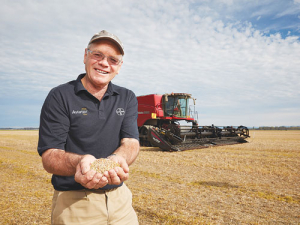At the time, he told them they would get a real bottle when they set a world record.
The fridge magnet is still in the Watsons’ kitchen, but this month the US-domiciled Philip had to courier in the real bottle of bubbly.
“We drank it the night Guinness confirmed the record,” they say with a smile, on the day Rural News visits to talk about the record.
The Watsons, who farm at Wakanui, about half-way between Ashburton and the coast, are now listed on www.guinnessworldrecords.com for their 16.791 tonnes of wheat per hectare, which beat the previous record of 16.519 tonnes held for two years by a UK farmer.
Planted in mid-April 2016, the crop of the Oakley variety was harvested in mid-February after a heavy regime of care, not just in nurturing the crop but also in monitoring every step to satisfy Guinness’s standards, which had recently been made more stringent.
It was the second season the Watsons had attempted a record, which was originally prompted by their agronomy advisers and chemical supplier Bayer.
Eric Watson says that with a lot of Bayer products used it meant prestige for the company, and it was an honour for the arable industry and New Zealand to have the record back in the country.
“Bayer said, ‘you can do it and we’re prepared to help you’. They did all the organisation. I just did the growing.”
He also thanked Yara Fertilisers, whose arable specialist Paul Johnston took fortnightly leaf samples for analysis, something the Watsons would not normally do for a crop more than a couple of times a season.
Meeting Guinness’s requirements required registering the attempt and surveying the fields even before the seed was drilled. On harvest day, cameras had to record the fields, the weighbridge and machinery, and everything was audited and witnessed by Justices of the Peace.
Their success comes a year after FAR chairman David Birkett, of Leeston, harvested an even greater yield of Oakley wheat, but could not claim an official record. At the time, Birkett was doubtful of the chances of bringing the record back to NZ because of Guinness’s newly stringent rules, but was unaware of the Watson’s attempt already underway.
Maxine Watson says the effort was beyond any one individual.
“I’m glad Eric got the recognition because he’s grown a lot of good wheat crops over the years. But one can’t go into it lightly.”
However, it was not just the prestige that made it worthwhile.
Maxine recounted a recent discussion at a FAR Women in Arable meeting when some questioned whether it was worth going for extra-high yields, because the extra inputs represented money wasted if the crop failed.
The response was that the extra inputs were in fact insurance against failure.
“You put in all that good stuff. You look after the crop and you’ll get the yield. It’s not likely to fall over if you pay attention to detail.” She says the Watsons had grown four paddocks of wheat.“Yield makes a big difference when it comes to the end of the day because [the record field] was the highest gross margin. They were all looked after really well, but the one that had the greatest yield had the greatest return.”
Eric says it was all about attention to detail and he’s still learning from the experience of the past two seasons.









